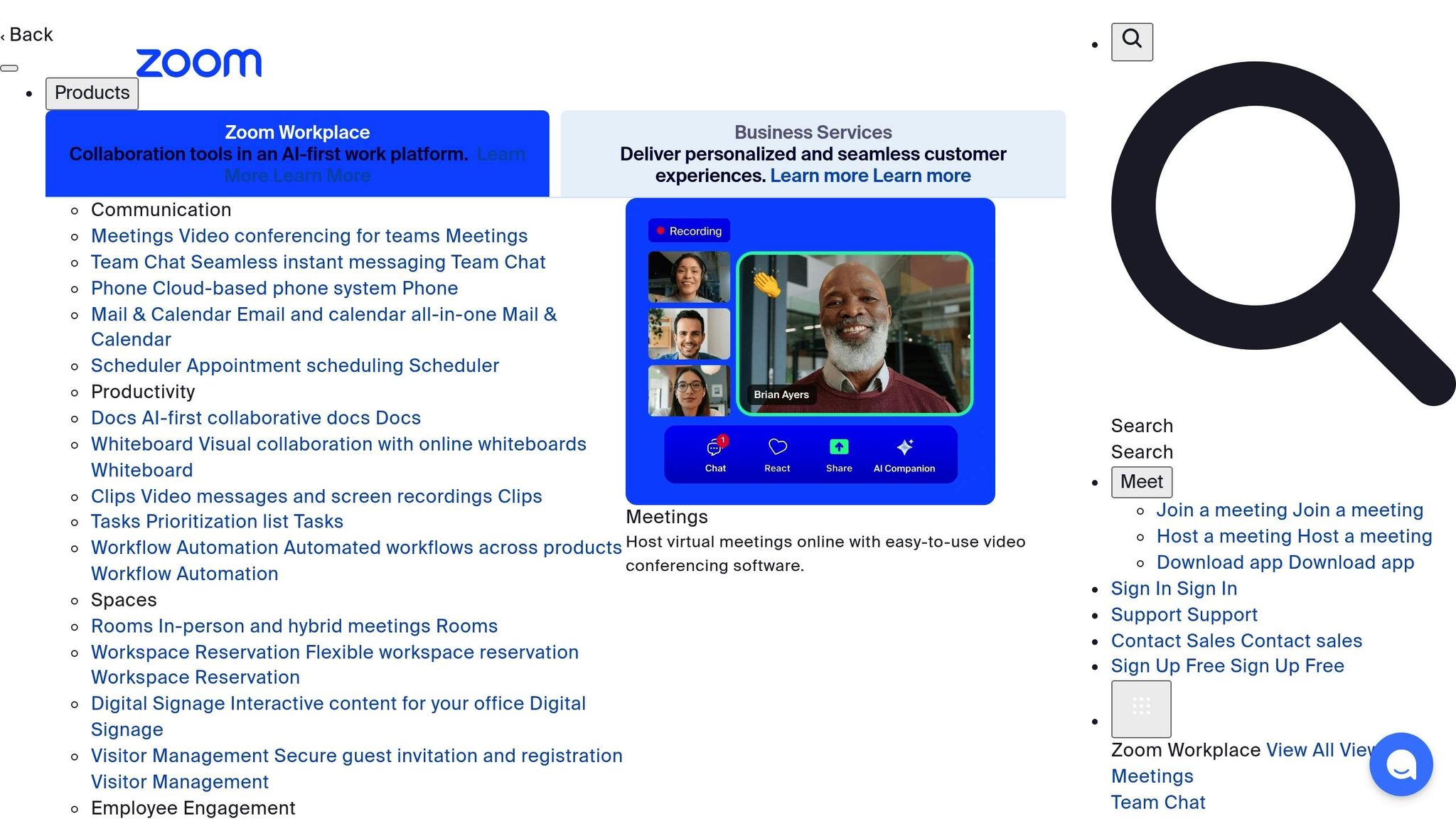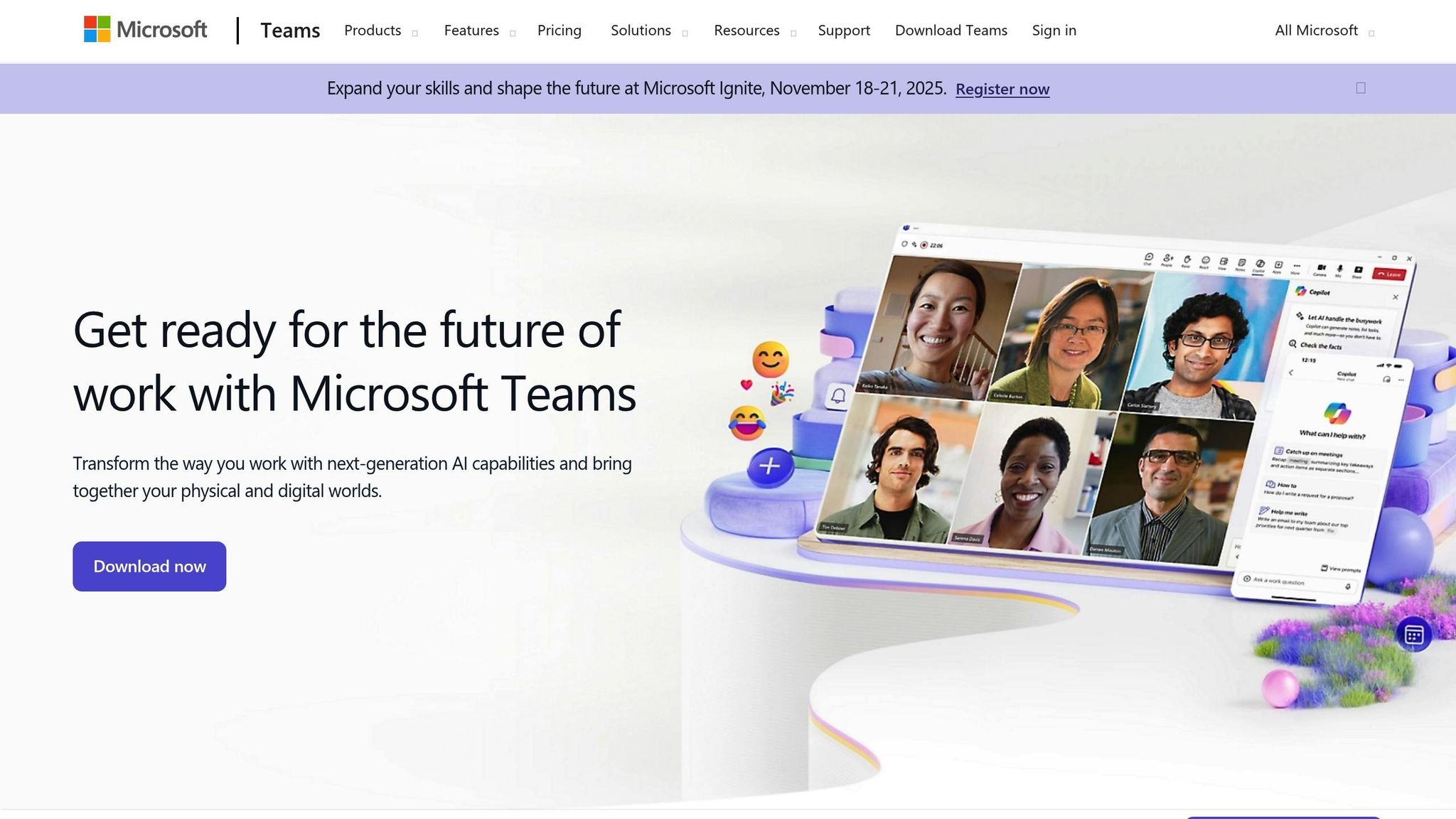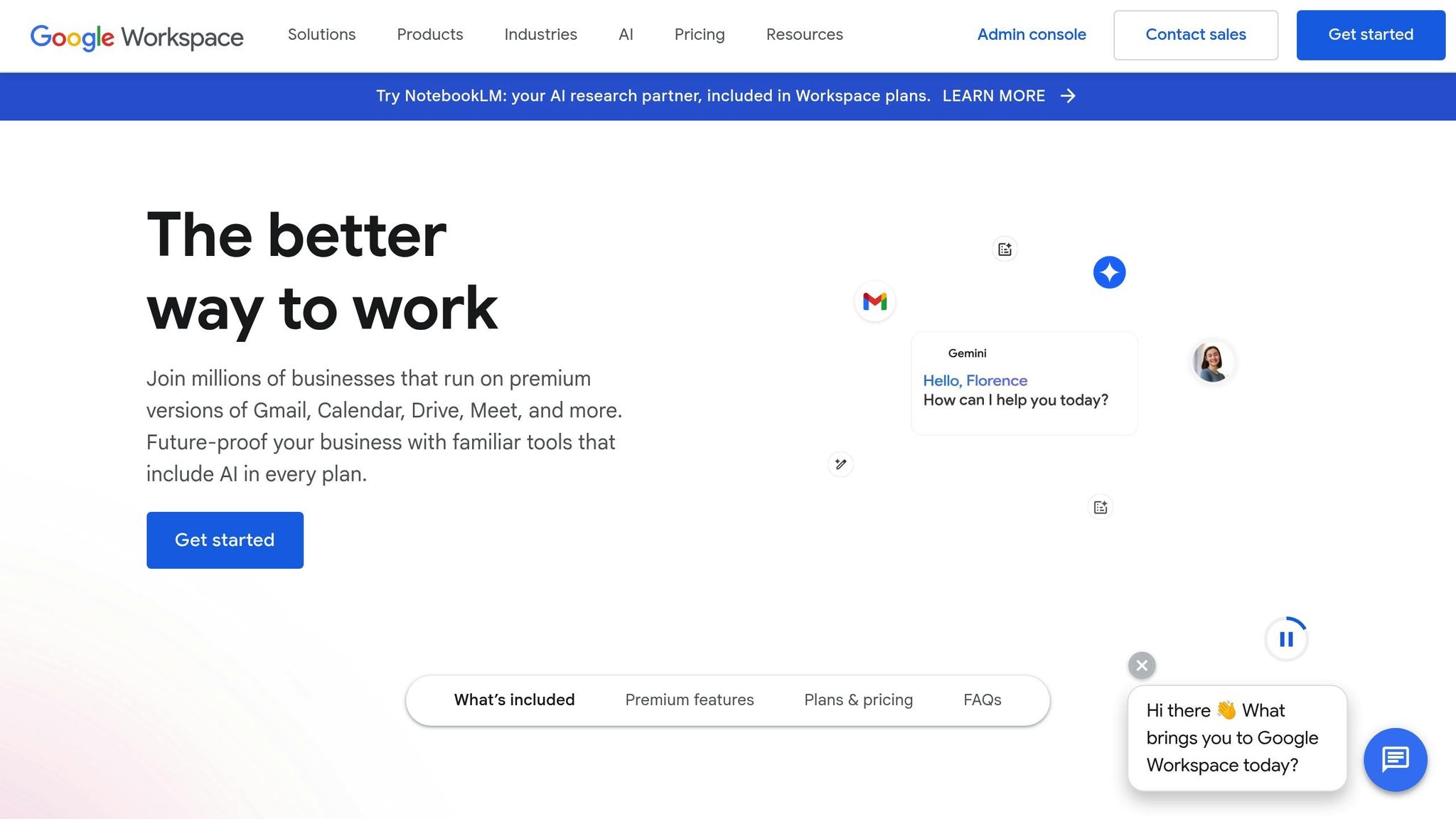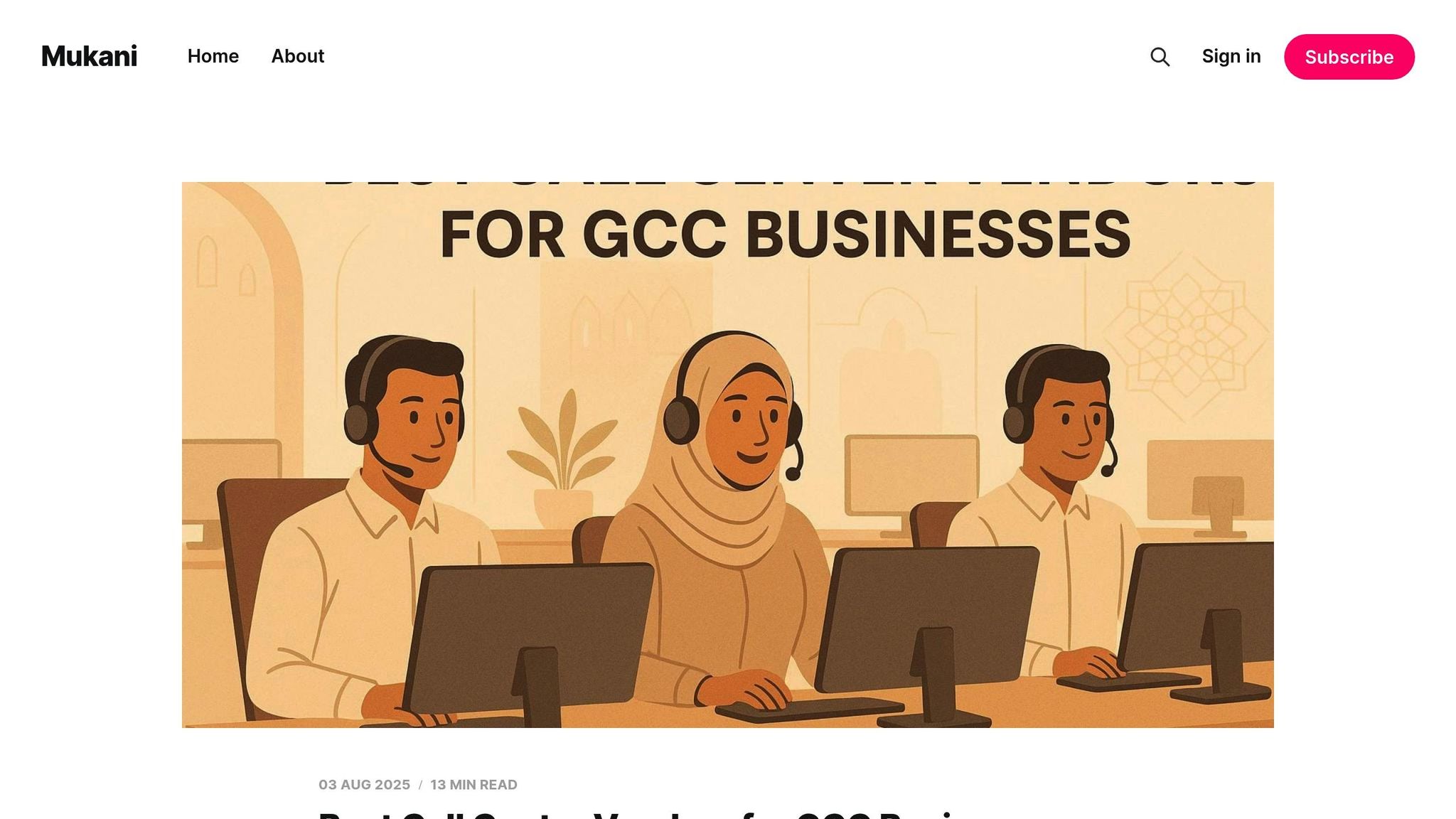Best Tools for Small Business Teams

Small businesses in Bahrain and the GCC are increasingly adopting digital tools to improve collaboration and efficiency. With SMEs making up 90% of businesses in the GCC but contributing only 20-30% of GDP, there’s significant potential for growth through technology. Video conferencing, project management, and cloud-based solutions are transforming how teams work in Bahrain's mobile-first, bilingual environment.
Here are five tools that stand out for small business teams in Bahrain:
- Zoom: Offers video conferencing with AI features, real-time translations, and strong integrations for seamless communication.
- Microsoft Teams: Combines chat, video calls, and file sharing with deep Microsoft 365 integration for streamlined workflows.
- Google Workspace: Provides email, cloud storage, and real-time document collaboration, starting at BD 28 per user annually.
- Asana: Focuses on task and project management, boosting productivity and ensuring timely project completion.
- Mukani: A free blog offering practical tips for inventory management and logistics tailored to GCC challenges.
Quick Comparison
| Tool | Core Features | Pricing (BHD) | Language Support | Best For |
|---|---|---|---|---|
| Zoom | Video calls, AI tools, integrations | Pay-as-you-go model | Multiple languages | Remote teams needing multilingual support |
| Microsoft Teams | Chat, video calls, file sharing | Contact local partner | Arabic, English | Teams using Microsoft 365 tools |
| Google Workspace | Email, storage, real-time collaboration | BD 28–84 per year | Arabic, English | Cloud-based collaboration |
| Asana | Task and project management | Free plan available | Multiple languages | Managing complex projects |
| Mukani | Inventory and logistics tips | Free | English | Physical workspace organization |
Each tool addresses specific needs, from communication and task management to physical logistics, helping small businesses in Bahrain thrive in a dynamic digital landscape.
1. Zoom

Zoom has redefined video conferencing and taken collaboration to the next level with its AI-driven Zoom Workplace. Designed with GCC workflows in mind, it caters to bilingual requirements and the remote work culture prevalent in Bahrain and the wider region. For small businesses, it addresses collaboration inefficiencies that can cost managers up to BD 6,225 annually.
Collaboration Features
Zoom Workplace integrates all the tools teams need for communication and productivity. From meetings, team chats, and phone calls to email, calendar, and scheduling, everything is bundled into one platform. On the productivity side, it offers whiteboards, clips, tasks, surveys, and document collaboration. The AI Companion takes collaboration further by summarising meetings, drafting chat replies, and even creating content for whiteboards.
For GCC teams, translated captions are a game-changer. They eliminate language barriers in meetings with international clients or diverse team members who operate in both Arabic and English. Frank Menne, Managing Director at OctoGate IT Security Systems GmbH, highlights the impact:
"Since we started using Zoom, we communicate better and work more efficiently. We have become much faster. In the way we develop things and how we respond to requests from partners and customers. With Zoom, we're much more agile."
The Zoom Whiteboard is another standout feature, enabling real-time visual collaboration for brainstorming and planning. Whether teams are based in a Manama office or working remotely, these tools ensure smooth collaboration and pave the way for seamless integration with other platforms.
Integration with Other Tools
Zoom doesn't just stop at offering robust features - it also connects effortlessly with other essential business tools. This is especially important as teams juggling more than 10 apps are twice as likely to waste over an hour daily on collaboration issues. Zoom bridges these gaps with integrations that simplify workflows.
| Integration | Primary Function |
|---|---|
| Microsoft Teams | Start meetings, make phone calls |
| Google Workspace | Schedule, join, and manage meetings |
| Salesforce | Add webinar registrants as leads |
| Dropbox | Share and back up files |
| Otter.ai | Transcribe Zoom meetings |
John Georgatos, Chief Information Officer at Mike Morse Law Firm, underscores the value of Zoom's integrations:
"I could have easily said, 'why pay for another platform?' but once I saw Zoom, it clicked in my mind. Zoom is simple and has the most integrations with Microsoft."
Accessibility Across Devices
Zoom excels in cross-device functionality, a critical feature in Bahrain’s mobile-first business landscape. With 91% of remote workers depending on video conferencing tools, Zoom ensures a consistent experience across desktops, tablets, and smartphones. This flexibility allows team members to stay connected and productive, no matter where they are or what device they use.
Relevance to GCC Workflows
Zoom supports both real-time and asynchronous collaboration, making it ideal for the fast-paced demands of businesses in the GCC. Its instant messaging and chat features allow for quicker responses and better knowledge sharing, aligning with the preferences of both leaders and employees. Whether it’s coordinating logistics, managing inventory across multiple locations, or handling customer relationships during busy periods, Zoom ensures smooth communication and project management.
2. Microsoft Teams

Microsoft Teams has become a go-to tool for small businesses in Bahrain, offering a platform that combines communication, file sharing, and project management into one efficient solution. With 95% adoption rates among major organisations like Gulf Air Group, Teams has proven its value across the GCC's diverse business landscape.
Collaboration Features
Teams enhances communication with features like unlimited group meetings that can last up to 30 hours and accommodate up to 300 participants. Its chat and messaging tools allow users to customise messages, tag colleagues, and share screens. The inline translation feature, which supports 35 languages, is particularly useful in Bahrain's multicultural business environment.
Additionally, Teams simplifies collaboration with real-time co-authoring and Microsoft Whiteboard integration for brainstorming sessions. Each user benefits from 10GB of cloud storage, ensuring secure and accessible file management.
The platform's use of channels helps teams stay organised. Channels allow for focused collaboration, with private channels offering controlled access for sensitive discussions and shared channels enabling secure collaboration with external partners and clients.
Integration with Other Tools
One of Teams' standout features is its integration with Microsoft 365 tools like Outlook, Word, Excel, and SharePoint, all of which are widely used across the GCC. Small businesses can also enhance their workflows by integrating apps from the Teams app store or creating custom solutions using no-code tools.
Ahmed Naeemi, Chief Technology Officer at Gulf Air Group, highlights the cost-saving benefits of this integration:
"First, we moved 3,800 group employees onto Microsoft 365 E5, consolidating multiple contracts across subsidiaries. This unification resulted in about 20% savings in software licensing."
These integrations make Teams a truly unified platform, streamlining operations and boosting productivity.
Accessibility Across Devices
In Bahrain's mobile-first culture, Teams ensures a consistent experience across desktops, tablets, and mobile devices. This flexibility supports the region's growing remote work trend. Gulf Air Group, for instance, uses Azure Virtual Desktop to make business applications accessible on any device. As Naeemi explains:
"Azure Virtual Desktop enables us to host all our specialized business applications on Azure and deploy an instance of these applications on any device, whether it's a computer, mobile device, or tablet."
This level of accessibility ensures that businesses can stay connected and productive regardless of location.
Relevance to GCC Workflows
Teams' support for Arabic and other languages makes it a natural fit for Bahrain's diverse workforce. The platform aligns with broader regional goals, such as Saudi Arabia's Vision 2030 and Smart Dubai, which promote cloud technology and modern workplace solutions.
The platform's impact is evident in Bahrain's Information & eGovernment Authority (iGA), which moved over 20,000 employees to the cloud. This shift led to saving approximately 100,000 working hours per week through remote collaboration. Dr. Khalid Ahmed Al Mutawah, Deputy CE of Operation & Governance at iGA Bahrain, shared:
"Using Microsoft 365, we can hold meetings, and share and work on the same documents at the same time from different places. As a result, Bahrain was up and running 24/7 during the pandemic."
For small businesses handling inventory, logistics, or client relationships across the GCC, Teams offers the reliability and scalability needed to thrive in today's digital economy.
3. Google Workspace

Google Workspace provides small businesses in Bahrain with an all-in-one cloud-based platform that combines email, document creation, video conferencing, and storage. It boasts 99.9% uptime reliability and starts at BD 2.3 per user per month.
Collaboration Features
Google Workspace stands out for its real-time collaboration tools, including Gmail, Drive, Docs, Sheets, Slides, and Meet. Teams can collaborate on documents, spreadsheets, and presentations simultaneously, with changes instantly reflected across all devices. The platform also incorporates Gemini AI, which assists with tasks like email drafting, document summarisation, and data analysis. It supports over 40 languages, including Arabic, making it particularly useful in Bahrain’s multilingual business environment. This aligns with the region's growing focus on AI, with the MENA region expected to see an AI-driven economic impact of BD 121 billion by 2030.
Google Meet offers seamless video conferencing with features like screen sharing, recording, and live captions, while Google Chat allows instant messaging and file sharing within dedicated project channels. Additionally, Workspace extends its functionality through a wide range of third-party integrations.
Integration with Other Tools
A key strength of Google Workspace is its ability to integrate with other tools via the Google Workspace Marketplace. Businesses can connect with essential apps like Salesforce, enabling synchronisation between Gmail, Google Calendar, and Salesforce. Other integrations include Microsoft Office 365, Zapier for automating workflows, and Okta for managing identities.
Tony Ramoutar, Senior Product Manager of Integrations at DocuSign, underscores the value of these integrations:
"The convenience our customers realize with our Google Workspace Add-on is huge, which is why it drives adoption and long-term retention of our eSignature services. When customers use our apps as integrations, they're less likely to churn. Our trial-to-paid subscription rates are two times higher when customers use the integration from the Google Marketplace versus when they just download our app from our website."
Accessibility Across Devices
Google Workspace’s cloud-based design ensures access across laptops, tablets, and smartphones, with offline functionality for uninterrupted productivity. This flexibility aligns with Bahrain's mobile-first business culture. Its vendor-neutral approach means businesses aren’t tied to specific hardware, making it suitable for teams using different operating systems.
Storage options are scalable to meet business needs, starting at 30GB per user with the Business Starter plan (BD 2.3 per month) and going up to 5TB per user in the Business Plus plan (BD 9.5 per month).
Relevance to GCC Workflows
Google Workspace aligns seamlessly with the GCC’s digital transformation goals. Its partnership with Saudi Arabia’s Public Investment Fund to expand the Dammam Cloud region and create an AI hub for Arabic-language models highlights Google’s commitment to the region. The platform’s AI tools also support the region’s ambitious growth plans, with AI’s contribution to the MENA economy expected to grow by 20–34% annually, particularly in the UAE and Saudi Arabia.
For small businesses in Bahrain and across the GCC managing logistics, client relationships, or inventory, Google Workspace offers the scalability and reliability necessary in a fast-evolving digital landscape. A 14-day free trial is available for businesses to test its suitability before subscribing.
Kelly Wright, Director of Workspace at SADA, summarises its impact:
"All the streamlined processes we've put in place empower our teams so that we can now take on bigger projects and help more organizations drive real business transformation by solving their most complex problems with Google Workspace."
4. Asana
Asana is a project management platform that complements communication tools like Zoom and Teams by focusing on organizing and executing tasks effectively. For small businesses in Bahrain, Asana can be a game-changer, delivering a 37% boost in productivity, 54% faster process execution, and 57% more projects completed on time - all while ensuring high-priority tasks are delivered three times faster.
Collaboration Features
Asana brings everything - tasks, file sharing, scheduling, and communication - into one place, breaking down silos and improving teamwork. Conversations can easily be turned into actionable tasks, and project statuses can be updated in real time across teams. This feature is especially useful for small businesses juggling multiple projects or coordinating between departments like sales, marketing, and operations.
Simon Levinson, Global Digital Manufacturing Process Innovation Manager at Danone, shared his thoughts on Asana's collaborative power:
"Asana makes everything shareable, which saves us time executing programs because it's so much easier to replicate and learn from what others have done."
The "My Tasks" view gives team members a clear snapshot of their assignments, while managers can oversee workloads, plan ahead, and avoid bottlenecks. These tools ensure resources are used efficiently and projects run smoothly.
Integration with Other Tools
Asana integrates with over 270 apps, helping businesses streamline their workflows by reducing the need to switch between platforms. Here are some key integrations:
| Integration Category | Tools | Key Benefits |
|---|---|---|
| Communication | Slack, Microsoft Teams, Gmail, Outlook | Turn conversations into tasks, sync calendars, and receive project updates |
| File Storage | Google Drive, Dropbox | Attach files to tasks and share folders easily |
| Development | GitHub, Jira | Link development updates and create issues from tasks |
| Time Tracking | Everhour, Harvest | Track billable hours and set up custom rates |
| Automation | Zapier | Automate routine tasks and connect various apps |
In August 2025, Asana introduced an integration with the Amazon Q index, which allows teams to access data from third-party apps directly within the platform. For example, marketing teams can pull campaign briefs from Google Docs or customer feedback from Salesforce without leaving Asana. Additionally, its API lets businesses automate tasks like sending emails, updating client records, or creating new subtasks.
Accessibility Across Devices
Asana stands out for its accessibility features, which include colour-blind mode, dark mode, and screen reader support. Its mobile apps for iOS and Android ensure team members can manage tasks anytime, anywhere. The platform is working towards WCAG 2.2 AA compliance, and its internal teams are improving accessibility by building scalable, user-friendly components.
Kostantino, an accessibility tester from Fable, commended Asana's efforts:
"Accessibility is not about just checking boxes. It's about sitting down with the full range of disabled users and seeing what it's like...I'm a big fan of the work that the Asana design and dev team has done."
Relevance to GCC Workflows
For businesses in Bahrain and the broader GCC region, Asana is tailored to meet local demands. Whether it's managing client relationships, coordinating logistics, or tracking inventory, Asana provides the structure needed to keep things running smoothly. Its templates simplify onboarding and ensure consistency across projects.
Romain Ehrhard, CIO at KENDO, highlighted this advantage:
"To hit our ambitious growth target, we need to move fast. But we can't do it without clear processes that remove as many blockers as possible. I'm a strong believer that implementing processes, like the ones we built in Asana, will help us drive success."
As businesses grow, Asana scales with them, offering advanced tools like portfolio management and custom fields. Its support resources - ranging from video tutorials to live training sessions - make it easy for teams to unlock the platform’s full potential. This is especially valuable for businesses handling complex logistics or working with multiple stakeholders.
5. Mukani

Mukani is an educational blog that shares practical guides on organisation, packing, space-saving, and logistics tailored for small business teams in the GCC.
Collaboration Features
Mukani provides hands-on advice to help businesses set up standardised procedures for tasks like inventory management, office layouts, and delivery coordination. These tips aim to cut down on confusion and save time. By sticking to clear organisational practices, team members can locate items faster, streamline handovers, and ensure tasks flow smoothly across different roles.
While digital tools can improve communication and task management, Mukani focuses on the physical organisation needed to make these tools work even better.
Relevance to GCC Workflows
As digital collaboration tools enhance communication, Mukani ensures your business's physical setup keeps up. For small businesses in Bahrain, the blog addresses local challenges like climate-controlled storage, limited commercial space, and the unique logistics of operating in the GCC.
With SMEs contributing about 30% to Bahrain's GDP, operational efficiency is key to staying competitive. Mukani’s focus on effective packing and secure storage is especially relevant in Bahrain’s humid climate and fluctuating temperatures, which can impact stored goods. The blog also offers logistics tips to help businesses streamline supply chains, organise deliveries, and make the most of warehouse space - ultimately cutting costs and improving customer satisfaction.
Subscribe to Mukani for expert advice on office organisation and inventory management.
Tool Comparison Chart
Here's a detailed comparison of tools based on pricing, features, device compatibility, and language options, tailored specifically for Bahrain's market needs.
| Tool | Pricing (BHD) | Core Features | Device Compatibility | Language Support |
|---|---|---|---|---|
| Zoom | Pay-as-you-go: BD 0.164/min (landlines), BD 0.194/min (mobile) | Video conferencing, screen sharing, webinars | Works on various devices and certified hardware | Multiple languages |
| Microsoft Teams | Contact local partner for a quote | Video calls, chat, file sharing, Office integration | Mobile devices, PC headsets, compatible IP phones | Arabic and English UI with extensive documentation |
| Google Workspace | BD 28–84 per user/year (Business Starter: BD 28; Standard: BD 56; Plus: BD 84) | Gmail, Drive, Meet, Calendar, Docs | Web-based, mobile apps, desktop access | Suggests local dial-in numbers; supports multiple languages |
| Asana | Free Personal plan (Paid plans available) | Task management, project tracking, team collaboration | Desktop app (Mac/Windows); Android app (7.1+) | Multiple languages |
| Mukani | Free subscription | Organisation guides, packing tips, logistics advice | Accessible via web on all devices | English content designed for GCC users |
Budget-Friendly Options for Bahrain SMEs
For small and medium-sized enterprises in Bahrain, Google Workspace's Business Starter plan at BD 28 per user annually and Asana's free plan are excellent low-cost solutions. For companies needing occasional international calls, Zoom's pay-as-you-go model is a practical choice.
GCC-Specific Workflow Integration
Microsoft Teams stands out with its bilingual Arabic and English support, making it user-friendly for Bahrain's diverse workforce. Meanwhile, Google Workspace simplifies regional conference calls by automatically suggesting local dial-in numbers. For physical workspace optimisation, Mukani's free resources provide practical guidance tailored to the Gulf's unique requirements. Together, these tools help businesses in Bahrain streamline both their digital and physical operations.
Final Thoughts
Finding the best digital collaboration tools for your small business in Bahrain means aligning their features with both your team's needs and the local context. It's clear from statistics that technology plays a key role in empowering small businesses.
When evaluating tools, make sure they fit your workflow and budget while also accommodating Bahrain's unique linguistic and operational requirements. Beyond the technical aspects, it's essential to consider the cultural context. For example, adapt to Bahrain's Sunday-to-Thursday workweek, respect prayer times, and keep in mind local workplace norms and hierarchies. These cultural factors are just as important as the technical capabilities of the tools you choose.
Focus on tools that offer smooth integration and room to grow with your business. Take advantage of free demos, and don’t overlook the importance of proper training to ensure a smooth transition.
FAQs
How do digital tools support small businesses in Bahrain and the GCC region?
Digital tools designed specifically for Bahrain and the GCC region cater to the distinct needs of small businesses by improving teamwork, simplifying daily tasks, and ensuring adherence to local laws. These tools often come equipped with features like real-time communication, task management, and integration with regional payment gateways, making everyday operations smoother and more efficient.
Many of these platforms also offer language options and are built to comply with local regulations, ensuring they are both user-friendly and practical for businesses in the region. Moreover, they align with initiatives such as Tamkeen's digital transformation programs, which encourage small businesses to embrace modern solutions and remain competitive in the local marketplace.
What should small businesses in Bahrain consider when evaluating the cost and value of collaboration tools?
When choosing collaboration tools, small businesses in Bahrain need to weigh upfront costs like licensing fees against recurring expenses, such as monthly or annual subscription charges. It’s also smart to account for extras, like advanced security options, compliance features, or tools that can grow alongside your business - especially if expansion is on the horizon.
To get the most out of your investment, focus on tools that meet your operational requirements while staying within your financial limits. Prioritise solutions that are easy to use, adaptable, and can grow alongside your business needs. A cost-benefit analysis can help you make informed decisions, ensuring the tools you choose boost productivity without straining your budget.
Additionally, consider Bahrain’s specific business landscape. Make sure the tools you pick comply with local regulations and are well-suited for small teams, helping you maintain smooth and efficient workflows.
What steps can small businesses take to successfully adopt and integrate digital collaboration tools into their workflows?
To make the most of digital collaboration tools, small businesses should involve their team from the start. Getting everyone on board during the decision-making stage helps ensure alignment and encourages participation. Offering clear training sessions and ongoing support can also build confidence among employees, making it easier for them to embrace these tools.
Efficiency can be improved by automating repetitive tasks and selecting tools that are intuitive and easy to navigate. In Bahrain, businesses have the added advantage of leveraging local resources like Mukani, which provides actionable advice on optimising workflows. By focusing on smooth integration and nurturing a team-oriented environment, small businesses can enhance both productivity and communication within their teams.